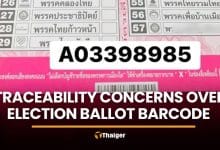Thai political fault line: Divided opinions on royal defamation law ahead of election

As Thailand’s general election approaches this Sunday, a series of TikTok videos featuring prime ministerial candidates answering questions about controversial topics has gone viral. The topics raised during the electoral campaign include the legalization of e-cigarettes, local alcohol industry deregulation, sex work decriminalization, and amending the country’s strict royal defamation law.
The royal defamation law, known as Section 112 of the Thai Criminal Code, is a sensitive subject in Thai society, as it stipulates that those who defame, insult, or threaten the king, queen, heir-apparent, or regent may face between three and fifteen years in prison. Increased public interest in Section 112 has led to it becoming a hot topic in political debates in the lead-up to the election.
Sunai Phasuk, a senior researcher on Thailand from Human Rights Watch, stated that the issue’s frequent presence in political discussions originated from the pro-democracy demonstrations that began three years ago, calling for monarchy reform. The 2020 protests, led predominantly by young Thais, made demands such as reducing the government budget for the monarchy and abolishing the royal defamation law.
Opinions on the law among politicians fall into three main categories. Some prime ministerial candidates—including incumbent Prime Minister Prayut Chan-o-cha—support maintaining the status quo. Other candidates, like Pita Limjaroenrat from the Move Forward Party, back amendments to the law, including reducing penalties and allowing only the Royal Household Bureau to press charges. A third point of view, represented by the Commoners’ Party, calls for the law’s abolishment, as they believe it has been weaponized to silence ordinary citizens.
A total of 1,902 individuals have been prosecuted for joining demonstrations or expressing political opinions between July 2020 and April 2023, according to data from Thai Lawyers for Human Rights (TLHR). Of these prosecutions, 242 cases involve accusations of lese-majeste.
Sunai Phasuk believes that the persisting relevance of the youth protests and their demands for monarchy reform illustrates the lasting impact of the demonstrations. He notes that Thai society is now clearly divided between those who wish to preserve the monarchy’s status quo and those seeking reform. Candidates on both sides have gained support due to their positions on the issue reports Channel News Asia.
However, political scientist Pitch Pongsawat from Chulalongkorn University argues that increased discussions about the lese-majeste law ahead of the election do not necessarily mean significant changes after the election. Pitch believes the upcoming election focuses more on the state of Thai democracy and the regime’s ability to maintain power after the economic downturn and the COVID-19 crisis.
Latest Thailand News
Follow The Thaiger on Google News:


























